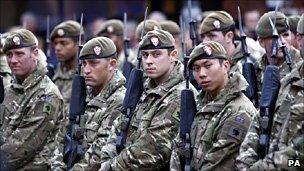Protect forces from pensions cuts - defence chief
- Published

Critics say military pensions should be made a special case
War widows and injured soldiers must be protected against the "worst excesses" of public sector pensions cuts, the head of Britain's armed forces has said.
General Sir David Richards said he was "concerned" at the plans which could leave hundreds of thousands worse off.
Labour has accused the government of a "breach of faith with armed forces and their families".
Downing Street rejected calls for a rethink on Friday.
A spokesman for Prime Minister David Cameron said "tough decisions" were needed and the policy decision had been made.
Ministers plan to link public sector pension rises to an alternative, and historically lower, inflation measure.
'Sympathy'
Gen Richards, chief of the defence staff, said that while he thought the change was a "done deal", he was working on making sure the "worst excesses are properly catered for".
Asked about the changes on BBC1's Andrew Marr Show, Gen Richards said: "We are concerned because the most important thing that the armed forces need to retain and keep happy are our people - we have got outstanding people - otherwise, if you like, our version of punching above our weight just wouldn't happen - so it is really important for all sorts of operational (reasons)."
He said there could be a rethink for widows and injured soldiers, but added: "I haven't talked to anyone senior in government about it and we are just starting.
He said there was a "huge amount of sympathy among ministers in the MoD" for the armed forces' position and they now had to look at mitigating "where the excesses are unacceptable".
Shadow defence secretary Jim Murphy said he was surprised the government had not found a solution to the row and said they now seemed "to have dug themselves in and been pretty dogmatic about this".
"This isn't about deficit reduction. It's a breach of faith with the armed forces and their families," he said.
"We don't think it's the right thing to do and the government should at this last moment change its mind."
'Too expensive'
Chancellor George Osborne announced in the June Budget that public sector pensions would, from April 2011, be linked to the consumer prices index (CPI) - rather than the retail prices index (RPI) - as part of a package aimed at saving £11bn, part of the government's efforts to reduce the record budget deficit.
The Forces Pensions Society calculates that the inflation link - which affects pensions and annual guaranteed income payments - means a 34-year-old wife of a staff sergeant killed in Afghanistan could lose almost £750,000 over her lifetime.
Writing in the Times, the society's head, Vice Admiral Sir Michael Moore, said: "It is so easy for Mr Cameron to extol the forces at every opportunity... but his words will have a hollow ring unless he addresses these issues personally."
But on Friday a Ministry of Defence spokesman said: "It is not possible to treat the armed forces differently from other public servants.
"Attempting to retrospectively change previous pension schemes could not be done - it would be too expensive, especially given the current financial situation."
He said that widows covered by the most recent armed forces pensions scheme, opened in 2005, did not lose pensions if they remarried.
A Downing Street spokeswoman added: "The prime minister has the highest regard for the armed forces and their families but tough decisions had to be made in this particular respect."
- Published12 November 2010
- Published12 November 2010
- Published23 June 2010
- Published10 August 2010